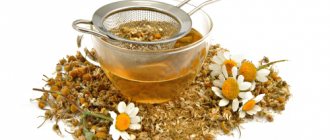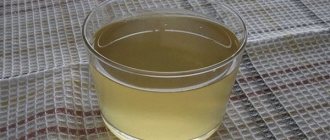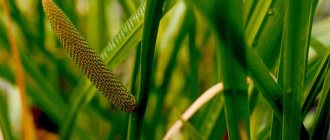What are the benefits of dried apricots?
Dried apricots are dried apricots without pits. The secret of the benefits of dried apricot for the body lies in its vitamin and mineral composition.
100g of this dried fruit contains:
- vitamin A - 65% of the daily value
- beta-carotene - 70%
- vitamin E – 37%
- vitamin PP – 20%
- vitamins B1, B2, B5, B6 - from 7% to 11%
- vitamins B4, B9, H, K, C - from 2 to 5%
- chrome - 118%
- silicon - 87%
- potassium - 69%
- copper - 34%
- magnesium - 26%
- phosphorus, iron, molybdenum - 18%
- calcium -16%
- manganese -12%
- iodine, selenium, zinc, fluorine, sodium - up to 4%
Due to its composition, this product has a healing effect on the body:
- cleanses of toxins
- improves vision
- improves the cardiovascular system
- supports immunity
- regulates the functioning of the gastrointestinal tract
Preventing constipation
If you are prone to constipation, regular consumption of dried apricots will allow your intestines to function normally. To do this, it is enough to eat several berries every morning on an empty stomach and wash them down with a glass of water or green tea:
- children – 2 pieces;
- adults – 5 pieces.
The effectiveness of dried apricots in the fight against constipation has been proven over many years of use. This product has high nutritional and taste qualities, which allows you to improve the functioning of the gastrointestinal tract without discomfort and complex therapy.
Dried apricots for constipation in children
If we are not talking about infants, then there are no restrictions on the use of this natural laxative, except in cases of individual intolerance.
The only thing that is important to remember is sufficient fluid intake into the body along with dried fruits!
[adsp-pro-2]
If we are talking about dried apricots as a complementary food, it is better to introduce it into the diet in the form of a decoction, starting with small doses and monitoring the reaction of the small organism (it can cause allergies).
Contraindications to the use of dried apricots
Despite the fact that dried apricots have a huge number of positive properties, some people are strictly not recommended to consume apricots and other fruits, including dried ones. Contraindications include the following:
- individual intolerance to fruits, dried fruits and components contained in their composition;
- obesity;
- any type of food allergy or tendency to it;
- acute indigestion.
Only if contraindications are observed can dried apricot therapy be carried out without fear.
Dried apricots during pregnancy
It's no secret that problems with stool during pregnancy are a common problem. It is related to:
- hormonal changes
- decreased activity
- compression of organs by the growing uterus
- taking certain mineral complexes
- restriction of fluid during edema
- emotional stress
The benefits of dried apricots for a woman’s body during pregnancy are due, firstly, to its rich content of vitamins and minerals, which are so necessary during this period. Especially if pregnancy occurs in the winter-spring months and the choice of vitamin products is small.
Secondly, during pregnancy, dried apricots will help to gently get rid of stool retention without the use of medications, which is especially pleasant.
Follow the norm! Do not consume more than 10-15 pieces per day and drink enough fluids if you choose this product.
In what cases is dried apricot contraindicated?
Despite the good results of taking dried apricots, it is not indicated for everyone. The following conditions are prohibited:
- individual intolerance to the product;
- acute inflammatory processes and disorders of the digestive system;
- intestinal obstruction;
- recent surgical interventions on the digestive organs;
- malignant formations on the gastrointestinal tract;
- food allergies.
Advice! If an allergic reaction occurs, stop eating dried apricots and prescribe symptomatic treatment with antihistamines.
How to take dried apricots for constipation?
Dried apricots are a fragrant, tasty and beautiful delicacy. You can eat it in its pure form, without processing. Before eating, dried fruits should be thoroughly washed by first soaking them in warm water for a few minutes. If you are tired of eating it in this form and want some variety, you can use dried apricots to prepare dishes that are good for digestion:
Compote and decoction
Unfortunately, the miraculous capabilities of dried apricot compote to relieve constipation are greatly exaggerated on the Internet. Yes, this compote is undoubtedly healthy; some of the microelements and vitamins are transferred into it from the fruit when cooked. But it contains practically no dietary fiber and does not help get rid of stool retention.
The same can be said about the benefits of dried apricot decoction (when dried apricots are poured with boiling water and left overnight). This decoction will help with constipation only if you eat steamed dried fruits along with it.
Recipe for constipation - prunes, dried apricots, senna
For this recipe you will need senna, dried apricots (or raisins) and prunes. You need to take 100g of dried fruits and 50g of dried herbs. Grind everything in a blender or meat grinder, transfer to a jar and store in the refrigerator. Take a teaspoon at night. The product is very effective, but it must be used with caution. Senna is a stimulant laxative; it contains quite harmless compounds - anthraglycosides.
It is important to understand that:
- The constant use of stimulants negatively affects the intestinal contractility, i.e. when you cancel them, you may find that the intestines refuse to perform their functions on their own
- abuse of laxatives with anthraglycosides causes dehydration
- Continuous use of senna for four or more months leads to changes in the large intestine - the intestinal mucosa is damaged and brown pigment accumulates (pseudomelanosis develops).
Contraindications to the use of this recipe:
- pregnancy
- lactation
- children's age up to 12 years
- kidney disease
- acute diseases of the stomach and intestines (gastritis, ulcers, etc.)
But the following recipe can be used without restrictions - it will bring nothing but benefits:
Prunes, dried apricots and honey for constipation
Grind prunes and dried apricots in equal proportions in a blender or meat grinder, add honey to taste. If desired, you can sprinkle chopped walnuts into the mixture.
You can modify the recipe - roll this mass into balls and roll in coconut flakes. The resulting candies are an excellent substitute for chocolate. You can store this delicacy in the refrigerator for quite a long time.
Dried apricots with kefir
Another option for preparing dried apricots for constipation is a cocktail with kefir. Pour kefir into a blender bowl and add dried apricots. You can supplement the recipe with raisins and walnuts. Beat in a blender. The result is a healthy and tasty dessert that can easily replace dinner.
• Home
dried apricots benefits and harms
How beautiful these dried fruits look! The berries are light yellow and shiny, but are dried apricots really that good: the benefits and harms of this product largely depend on its appearance. And there should be no illusions here - proper and healthy dried apricot halves should be dark and ugly. And the reason for this is that to prepare dried apricots, you need to use the natural factors of the sun, and not industrial chemical methods.
Dried apricots: what is useful in the product
The composition of biologically active substances contained in dried apricots creates conditions for the widespread use of dried apricots not only for food, but also for their effects on the human body. In particular, when thoughts arise about the effect on the intestines (what does dried apricots do, weaken or strengthen?), there is no need to even doubt that dried apricots provide a good healing effect for constipation.
1. Vitamins
Dried apricots contain quite a lot of vitamin E, A, folic and nicotinic acid, so using dried fruit in food will help the functioning of the heart and blood vessels, increase immune defense and improve metabolism.
2. Minerals
The concentrated content of microelements (calcium, magnesium, potassium, iron, phosphorus) allows you to provide the body with useful substances when consuming even small quantities of dried apricots.
3. Fiber
Thanks to pectins and organic fiber, dried apricots affect intestinal motility, providing a good laxative effect.
Dried apricots: what is the harm?
And everything would be fine if it weren’t for the negative aspects that dried apricots have. The calorie content of the product is high due to the large amount of carbohydrates. An increased amount of sugar gives the product excellent taste, but it can have a negative effect on fat metabolism and increase glucose levels, which is not at all necessary for people with diabetes. In addition, we must remember that manufacturers can use the industrial method of harvesting dried apricots when the chemical substance sulfur dioxide is used. In light of this, dried apricots do not look entirely clear, the benefits and harms of which do not allow the product to be widely and uncontrolledly recommended and used.
How to use dried apricots
1. Help with constipation
To the naive question about what dried apricots do, weakens or strengthens, there is one clear answer. Of course, dried apricots help relieve constipation, and this effect is achieved due to fiber and pectins. And it would be stupid not to use this wonderful action. The recipe for relaxation is simple: for 5-6 dried apricots you need 200 ml of boiling water. The liquid infused overnight should be drunk in the morning and the berries should be eaten. The laxative effect will be more pronounced if prunes are used together with dried apricots.
2. Help the heart
In cases where a person has heart disease, dried apricots can improve the function of the heart muscle. And this effect is explained by the fact that dried apricots contain many trace elements, and, in particular, potassium and magnesium. It is these minerals that are very necessary for angina pectoris and cardiac ischemia. It is enough to eat a small handful of berries every day to ensure normal heart function.
Using dark varieties of dried apricots, you can be sure that the apricot halves were dried in the sun.
And it is very undesirable to constantly eat light yellow berries, even if they are more beautiful dried apricots. The calorie content of dried fruit and the presence of a large amount of sugar in it do not allow us to recommend the product to people with endocrine diseases. However, if dried apricots are used correctly and wisely, there will definitely be a positive effect, especially if this product is recommended by a doctor. Take part in the discussion of this topic on the forum.
Share with friends:
Which is better for laxatives, dried apricots or prunes?
As we have already discussed above, the laxative properties of dried apricots are due only to the presence of dietary fiber in its composition. Prunes, in addition to containing the same fibers, contain substances that soften stool and have a laxative effect. Prunes are nothing more than dried plums. Many of us experienced the cleansing effect of the garden plum as children. And if you choose which is better for constipation - dried apricots or prunes, you can confidently give the palm in this fight to prunes.
Post Views: 8,503
Composition and calorie content
Depending on what kind of dried fruits or berries you use to prepare the compote, its chemical composition will also change.
But, as a rule, it contains the following elements characteristic of most fruits:
- vitamins A, PP, B, C;
- calcium;
- magnesium;
- iron;
- phosphorus;
- potassium.
The average calorie content of 100 ml of a finished drink prepared without sugar is about 50 kcal. At the same time, it contains no fat, almost no protein, and approximately 15 grams of carbohydrates.
How to properly store and select dry fruits
Dry fruits should be stored in a dark place in fabric bags. This will help the workpiece “breathe” and protect it from mold.
It is better to drink the ready-made compote within a couple of days after preparation in order to get the maximum vitamins and benefits. If necessary, refrigerate it to prevent it from spoiling.
Choose the right ingredients for compote:
- the color of dry fruits should not be very different from the color of fresh ones and should not be too bright;
- dry slices should not shine, otherwise we may be talking about adding oil;
- the aroma should be fresh with a slight sour note;
- the slices should not stick to each other;
- Remember to wash dry fruit thoroughly before cooking - this will help remove any contaminants or harmful substances.
Use for various diseases
If you eat fruits regularly, you will significantly strengthen your body, because fresh and dried fruits can fight many ailments. Therefore, compote is considered an excellent replacement for industrial juices: it contains only natural ingredients, there is no added sugar, and you can prepare it at any time of the year, even in winter.
The drink helps with the following diseases.
- Gastritis and stomach ulcers - if these diseases are in remission. The best drink is made from apples and pears. If there is high acidity, avoid adding raisins.
- Pancreatitis - in this case, dried rose hips, dried apricots, and prunes are well suited for making compote. Do not use berries, quinces and overly sour apples, which can only worsen the condition.
- Diabetes mellitus – there is no need to add sugar to the compote, which means it will not harm diabetics. Remember that dry apricots also contain a lot of sugars, so you should avoid them.
- Poisoning - the drink will allow you to quickly remove toxins, give you strength, and also help maintain the amount of moisture in the body at the required level. Remember that when you add raisins to the compote, you will also get an excellent remedy for diarrhea.
Benefits for pregnant and lactating women
This drink provides pregnant women with most of the necessary vitamins combined with a pleasant taste. Compote helps pregnant women reduce swelling or avoid it altogether, as well as improve the functioning of the digestive system, which often malfunctions during this delicate period.
When breastfeeding, boiled dry fruits can increase milk supply and also add a little more variety to a limited diet.
After the birth of a baby, a woman needs to be very careful in choosing dishes for herself, because what she eats, then the baby will receive along with her milk. Therefore, I recommend drinking dried fruit compote very carefully, carefully monitoring the reaction of the baby’s body. For example, you can start drinking a drink with prunes and raisins a month after giving birth, but you should add dried apricots only after two to three months.
Naturally, if a woman is allergic to any of the fruits, then it should be excluded from the compote.
Benefits for weight loss
During a strict diet, compote will help a person get the necessary vitamins and microelements, diversify his menu and at the same time will not negatively affect the calorie counter - after all, it is very light.
There are also special recipes that are ideal for weight loss, for example:
- water – one and a half liters;
- dried apples – 400 grams;
- bee honey – 100 grams.
Rinse the apples thoroughly, pour boiling water over them and cook for 5 minutes. Then leave to steep for 3-4 hours in a saucepan with the lid closed. When the drink reaches room temperature, add honey to it and mix thoroughly.
This way you will get a compote full of natural substances, but without sweeteners and extra calories.
Details about which dry fruits are best to use during a diet are written in the article on our website.
Sometimes I prefer to use dried fruits as a healthy dessert that you can eat rather than drink: just take a few boiled fruits without liquid, add a little cinnamon and a spoonful of sugar-free ice cream.
Attention! Try to keep track of what fruits you use when making compote. This way you can be sure that it will bring you benefit and not harm.











